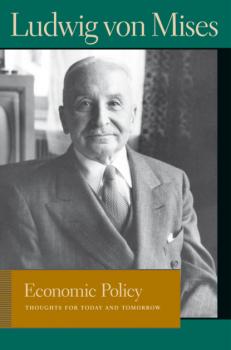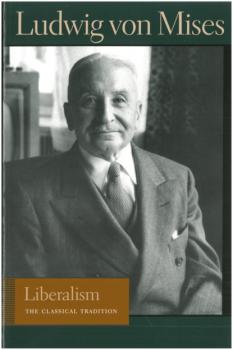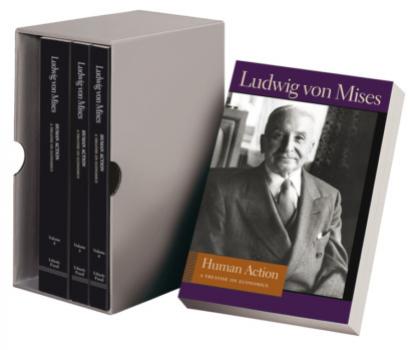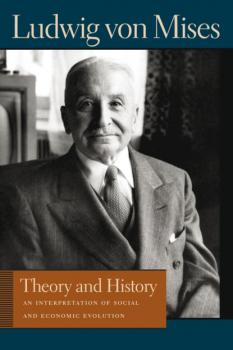ТОП просматриваемых книг сайта:















Людвиг фон Мизес
Список книг автора Людвиг фон МизесАннотация
Economic Policy contains six lectures Ludwig von Mises delivered in 1959 for the Centro de Estudios sobre la Libertad in Argentina. The lectures were posthumously edited by Mises’s wife, Margit, and George Koether, a student and long-time friend of Mises. This volume serves as an excellent introduction to what Mises sees as the simple truths of history in terms of economic principles. In straightforward language, Mises explains topics such as capitalism, socialism, interventionism, inflation, foreign investment, and economic policies and ideas.Ludwig von Mises (1881–1973) was the leading spokesman of the Austrian School of economics throughout most of the twentieth century.Bettina Bien Greaves is a former resident scholar and trustee of the Foundation for Economic Education and was a senior staff member at FEE from 1951 to 1999. Please note: This title is available as an ebook for purchase on Amazon, Barnes and Noble, and iTunes.
Аннотация
This book presents the theoretical and practical arguments for liberalism in the classical tradition as defined by Mises as “the liberal doctrine of the harmony of the rightly understood interests of all members of a free society founded on the principle of private ownership of the means of production.” The foundation of liberalism, Mises says, rests on an understanding and appreciation of private property, social cooperation, the freedom idea, ethics and morality, democracy, and the legitimate role of government. Also in this book, Mises contrasts liberalism with other conceivable systems of social organization such as socialism, communism, and fascism.Ludwig von Mises (1881–1973) was the leading spokesman of the Austrian School of economics throughout most of the twentieth century.Bettina Bien Greaves is a former resident scholar and trustee of the Foundation for Economic Education and was a senior staff member at FEE from 1951 to 1999. Please note: This title is available as an ebook for purchase on Amazon, Barnes and Noble, and iTunes.
The Anti-capitalistic Mentality - Людвиг фон Мизес
Liberty Fund Library of the Works of Ludwig von MisesАннотация
In Human Action, Mises starts from the ideas set forth in his Theory and History that all actions and decisions are based on human needs, wants, and desires and continues deeper and further to explain how studying this human action is not only a legitimate science (praxeology) but how that science is based on the foundation of free-market economics.Mises presents and discusses all existing economic theories and then proceeds to explain how the only sensible, realistic, and feasible theory of economics is one based on how the needs and desires of human beings dictate trends, affect profits and losses, adjust supply and demand, set prices, and otherwise maintain, regulate, and control economic forces.Ludwig von Mises (1881–1973) was the leading spokesman of the Austrian School of economics throughout most of the twentieth century.Bettina Bien Greaves is a former resident scholar and trustee of the Foundation for Economic Education and was a senior staff member at FEE from 1951 to 1999. Please note: This title is available as an ebook for purchase on Amazon, Barnes and Noble, and iTunes.
Аннотация
Theory and History is primarily a critique of Karl Marx, his materialism, and his prediction of the inevitability of socialism. Marx attributes the creation of tools and machines, as well as the economic structure of society, to undefined “material productive forces.” Mises rejects this materialistic view; he points out that tools and machines are actually created by individuals acting on the basis of non-materialistic ideas.This book discusses the theory of economics, i.e., the study of purposive human action, and history, the record of the past actions of individuals.Ludwig von Mises (1881–1973) was the leading spokesman of the Austrian School of economics throughout most of the twentieth century.Bettina Bien Greaves is a former resident scholar and trustee of the Foundation for Economic Education and was a senior staff member at FEE from 1951 to 1999. Please note: This title is available as an ebook for purchase on Amazon, Barnes and Noble, and iTunes.
The Ultimate Foundation of Economic Science - Людвиг фон Мизес
Liberty Fund Library of the Works of Ludwig von MisesАннотация
In this volume, Mises argued that economics is a science because human action is a natural order of life and that it is the actions of humans that determine markets and capital decisions. Since Mises believed these links could be proven scientifically, he concluded that economics, with its basis on that human action, is indeed a science in its own right and not an ideology or a metaphysical doctrine.Ludwig von Mises (1881–1973) was the leading spokesman of the Austrian School of economics throughout most of the twentieth century.Bettina Bien Greaves is a former resident scholar and trustee of the Foundation for Economic Education and was a senior staff member at FEE from 1951 to 1999.Please note: This title is available as an ebook for purchase on Amazon, Barnes and Noble, and iTunes.
Аннотация
Interventionism provides Mises’s analysis of the problems of government interference in business from the Austrian school perspective. Written in 1940, before the United States was officially involved in World War II, this book offers a rare insight into the war economies of Hitler’s Germany and Mussolini’s Italy. Mises criticizes the pre–World War II democratic governments for favoring socialism and interventionism over capitalist methods of production. Mises contends that government’s economic role should be limited because of the negative political and social consequences of the economic policy of interventionism.Ludwig von Mises (1881–1973) was the leading spokesman of the Austrian School of economics throughout most of the twentieth century.Bettina Bien Greaves is a former resident scholar and trustee of the Foundation for Economic Education and was a senior staff member at FEE from 1951 to 1999. Please note: This title is available as an ebook for purchase on Amazon, Barnes and Noble, and iTunes.
On the Manipulation of Money and Credit - Людвиг фон Мизес
Liberty Fund Library of the Works of Ludwig von MisesАннотация
The three treatises in On the Manipulation of Money and Credit were written in German between 1923 and 1931. Together they include some of Mises’s most important contributions to monetary and trade-cycle theories and constitute a precursor to Mises’s major work, Human Action.Ludwig von Mises (1881–1973) was the leading spokesman of the Austrian School of economics throughout most of the twentieth century.Bettina Bien Greaves is a former resident scholar and trustee of the Foundation for Economic Education and was a senior staff member at FEE from 1951 to 1999.Please note: This title is available as an ebook for purchase on Amazon, Barnes and Noble, and iTunes.
Monetary and Economic Policy Problems Before, During, and After the Great War - Людвиг фон Мизес
Selected Writings of Ludwig von MisesАннотация
The present volume is devoted to some of Mises’s earliest writings. As with the second volume in the series, the articles that compose this book include Mises’s policy memoranda, essays, and speeches that were found in a formerly secret KGB archive in Moscow. The articles have two primary focuses: First, they reveal Mises’s thoughts on the monetary, fiscal, and general economic policy problems of the Austro-Hungarian Empire before and during World War I; and second, they focus on his thoughts on the new postwar Austrian Republic after the dismantling of the Habsburg monarchy.An appendix to the volume includes a curriculum vitae that Mises’s great-grandfather prepared for the Habsburg emperor in 1881 as part of his ennoblement, which gave him and his heirs the hereditary title of “Edler von.” Also included is a talk that Mises delivered at his private seminar in his office at the Vienna Chamber of Commerce in the spring of 1934 on the topic of the methodology of the social sciences.Ludwig von Mises (1881–1973) was the leading spokesman of the Austrian school of economics throughout most of the twentieth century.Richard Ebeling is Professor of Economics at Northwood University. Please note: This title is available as an ebook for purchase on Amazon, Barnes and Noble, and iTunes.










